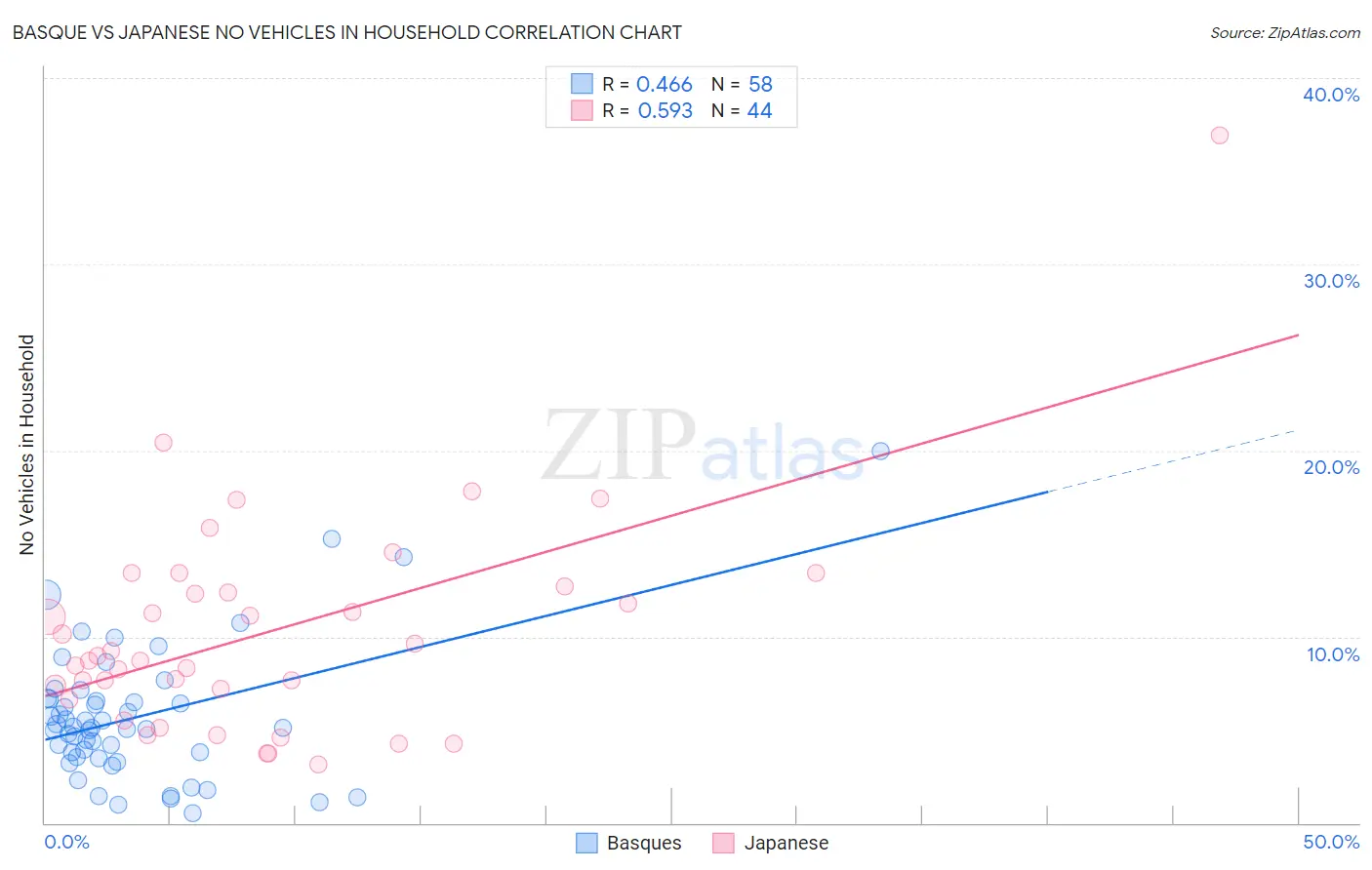Basque vs Japanese No Vehicles in Household
COMPARE
Basque
Japanese
No Vehicles in Household
No Vehicles in Household Comparison
Basques
Japanese
7.8%
NO VEHICLES IN HOUSEHOLD
99.9/ 100
METRIC RATING
37th/ 347
METRIC RANK
9.4%
NO VEHICLES IN HOUSEHOLD
94.1/ 100
METRIC RATING
116th/ 347
METRIC RANK
Basque vs Japanese No Vehicles in Household Correlation Chart
The statistical analysis conducted on geographies consisting of 165,489,078 people shows a moderate positive correlation between the proportion of Basques and percentage of households with no vehicle available in the United States with a correlation coefficient (R) of 0.466 and weighted average of 7.8%. Similarly, the statistical analysis conducted on geographies consisting of 248,891,204 people shows a substantial positive correlation between the proportion of Japanese and percentage of households with no vehicle available in the United States with a correlation coefficient (R) of 0.593 and weighted average of 9.4%, a difference of 21.4%.

No Vehicles in Household Correlation Summary
| Measurement | Basque | Japanese |
| Minimum | 0.51% | 3.2% |
| Maximum | 20.0% | 36.9% |
| Range | 19.5% | 33.7% |
| Mean | 5.7% | 10.2% |
| Median | 5.1% | 8.9% |
| Interquartile 25% (IQ1) | 3.6% | 6.9% |
| Interquartile 75% (IQ3) | 6.7% | 12.6% |
| Interquartile Range (IQR) | 3.1% | 5.6% |
| Standard Deviation (Sample) | 3.7% | 5.9% |
| Standard Deviation (Population) | 3.6% | 5.8% |
Similar Demographics by No Vehicles in Household
Demographics Similar to Basques by No Vehicles in Household
In terms of no vehicles in household, the demographic groups most similar to Basques are Creek (7.8%, a difference of 0.14%), Iraqi (7.7%, a difference of 0.25%), Cherokee (7.7%, a difference of 0.39%), Immigrants from Vietnam (7.7%, a difference of 0.53%), and Immigrants from Taiwan (7.7%, a difference of 0.66%).
| Demographics | Rating | Rank | No Vehicles in Household |
| Finns | 100.0 /100 | #30 | Exceptional 7.7% |
| Native Hawaiians | 100.0 /100 | #31 | Exceptional 7.7% |
| Malaysians | 100.0 /100 | #32 | Exceptional 7.7% |
| Immigrants | Taiwan | 100.0 /100 | #33 | Exceptional 7.7% |
| Immigrants | Vietnam | 100.0 /100 | #34 | Exceptional 7.7% |
| Cherokee | 99.9 /100 | #35 | Exceptional 7.7% |
| Iraqis | 99.9 /100 | #36 | Exceptional 7.7% |
| Basques | 99.9 /100 | #37 | Exceptional 7.8% |
| Creek | 99.9 /100 | #38 | Exceptional 7.8% |
| Immigrants | Fiji | 99.9 /100 | #39 | Exceptional 7.8% |
| Czechoslovakians | 99.9 /100 | #40 | Exceptional 7.8% |
| French Canadians | 99.9 /100 | #41 | Exceptional 7.8% |
| Swiss | 99.9 /100 | #42 | Exceptional 7.9% |
| Chickasaw | 99.9 /100 | #43 | Exceptional 7.9% |
| Choctaw | 99.9 /100 | #44 | Exceptional 7.9% |
Demographics Similar to Japanese by No Vehicles in Household
In terms of no vehicles in household, the demographic groups most similar to Japanese are Navajo (9.4%, a difference of 0.070%), Serbian (9.4%, a difference of 0.13%), Chippewa (9.4%, a difference of 0.17%), Immigrants from Netherlands (9.4%, a difference of 0.56%), and Armenian (9.4%, a difference of 0.66%).
| Demographics | Rating | Rank | No Vehicles in Household |
| Maltese | 97.6 /100 | #109 | Exceptional 9.1% |
| Delaware | 97.2 /100 | #110 | Exceptional 9.2% |
| Immigrants | Kuwait | 95.1 /100 | #111 | Exceptional 9.4% |
| Armenians | 95.0 /100 | #112 | Exceptional 9.4% |
| Immigrants | Netherlands | 94.8 /100 | #113 | Exceptional 9.4% |
| Serbians | 94.3 /100 | #114 | Exceptional 9.4% |
| Navajo | 94.2 /100 | #115 | Exceptional 9.4% |
| Japanese | 94.1 /100 | #116 | Exceptional 9.4% |
| Chippewa | 93.8 /100 | #117 | Exceptional 9.4% |
| Greeks | 92.9 /100 | #118 | Exceptional 9.5% |
| Fijians | 92.7 /100 | #119 | Exceptional 9.5% |
| Immigrants | Thailand | 92.6 /100 | #120 | Exceptional 9.5% |
| Puget Sound Salish | 92.4 /100 | #121 | Exceptional 9.5% |
| Costa Ricans | 92.3 /100 | #122 | Exceptional 9.5% |
| Blackfeet | 91.4 /100 | #123 | Exceptional 9.6% |